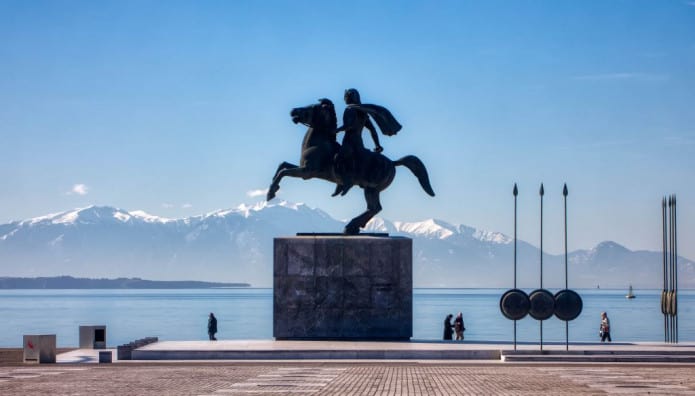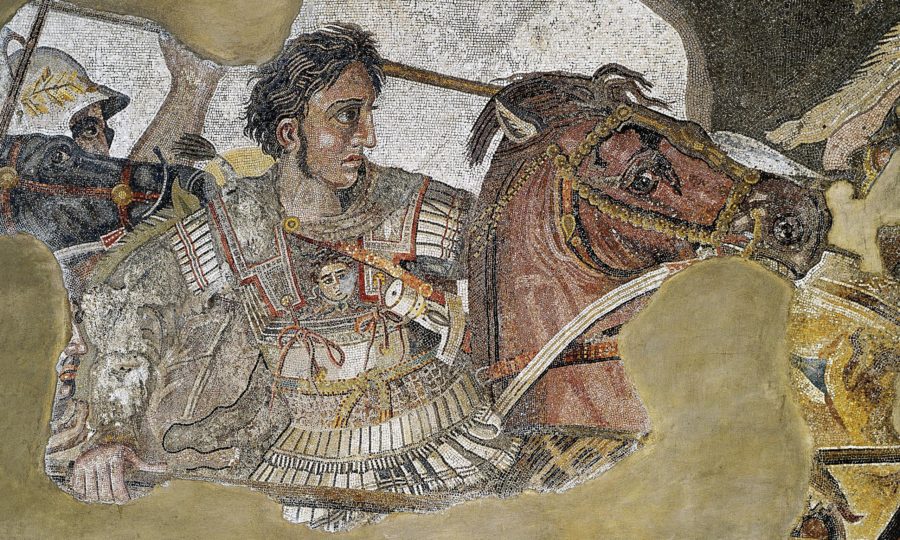Alexander the Great, otherwise referred to as the “King of Kings” was born on July 20 or 21, 356 B.C. in Pella, Macedonia. He was tutored by philosopher Aristotle until the age of 16. He became King of the Ancient Greek Kingdom of Macedonia and led a Pan-Hellenic military campaign against Persia and in the process spread Greek culture across the entire empire he created.
Conqueror and king of Macedonia, Alexander the Great was born on July 20 or 21, 356 B.C., in Pella, in the Ancient Greek kingdom of Macedonia. During his leadership, from 336 to 323 B.C., he united the Greek city-states and led the Corinthian League. He also became the king of Persia, Babylon and Asia, and created Macedonian colonies in the region. While considering the conquests of Carthage and Rome, Alexander died of malaria in Babylon on June 13, 323 B.C.
Alexander the Great was born to parents King Philip II of Macedon and Queen Olympia, daughter of King Neoptolemus. The young prince and his sister were raised in Pella’s royal court.
Alexander received his earliest education under the tutelage of his relative, Leonidas of Epirus. Leonidas, who had been hired by King Phillip to teach Alexander math, horsemanship and archery, struggled to control his rebellious student. Alexander’s next tutor was Lysimachus, who used role-playing to capture the restless boy’s attention. Alexander particularly delighted in impersonating the warrior Achilles.

In 343 B.C., King Philip II hired the philosopher Aristotle to tutor Alexander at the Temple of the Nymphs at Meiza. Over the course of three years, Aristotle taught Alexander and his friends philosophy, poetry, drama, science and politics. Seeing that Homer’s Iliad inspired Alexander to dream of becoming a heroic warrior, Aristotle encouraged him.
In 336, in the wake of his father’s death, Alexander, then 19, was determined to seize the throne by any means necessary. He quickly garnered the support of the Macedonian army, including the general and troops he had had fought with at Chaeronea. The army proclaimed Alexander the feudal king and proceeded to help him murder other potential heirs to the throne.
Part of Alexader the Great’s agenda was his campaign to conquer Egypt. After besieging Gaza on his way to Egypt, Alexander easily achieved his conquest; Egypt fell without resistance. In 331, he created the city of Alexandria, designed as a hub for Greek culture and commerce. Later that year, Alexander defeated the Persians at the Battle of Gaugamela. With the collapse of the Persian army, Alexander became “King of Babylon, King of Asia, King of the Four Quarters of the World.”
Alexander’s next conquest was eastern Iran, where he created Macedonian colonies and in 327 seized the fortress in Ariamazes. After capturing Prince Oxyartes, Alexander married the prince’s daughter, Rhoxana.
While considering the conquests of Carthage and Rome, Alexander the Great died of malaria in Babylon (now Iraq), on June 13, 323 B.C. He was just 32 years old. Rhoxana gave birth to his son a few months later.
After he died, his empire collapsed and the nations within it battled for power. Over time, the cultures of Greece and the Orient synthesized and thrived as a side effect of Alexander’s empire, becoming part of his legacy and spreading the spirit of what is referred to as “Panhellenism.”
Some of Alexander the Great’s most famous quotes-
“There is nothing impossible to him who will try.”
.“I am indebted to my father for living, but to my teacher for living well.”
“Remember upon the conduct of each depends the fate of all.”
Interesting Facts on Alexander the Great –
-In 15 years of conquest Alexander never lost a battle.
–He was taught by Aristotle but was also in contact with other famous Ancient Greek philosophers
-When Alexander met his future wide Roxanne, it was love at first sight
-The cause of Alexander’s death remains one of the greatest mysteries of the ancient world.
-Alexander’s body was preserved in a vat of honey.
Beyond Alexander the Great
'Beyond Alexander the Great', is a short video directed, filmed and edited by hyperlapse photographer and filmmaker Sotiris Konstantinidis.
“It is dedicated to all the Greeks to those who know to be Greek and don’t forget,” says Sotiris.
*Watch the video here
READ MORE: Professor Bidas: Tomb of Alexander the Great’s mother was found in Korinos (PHOTOS).


